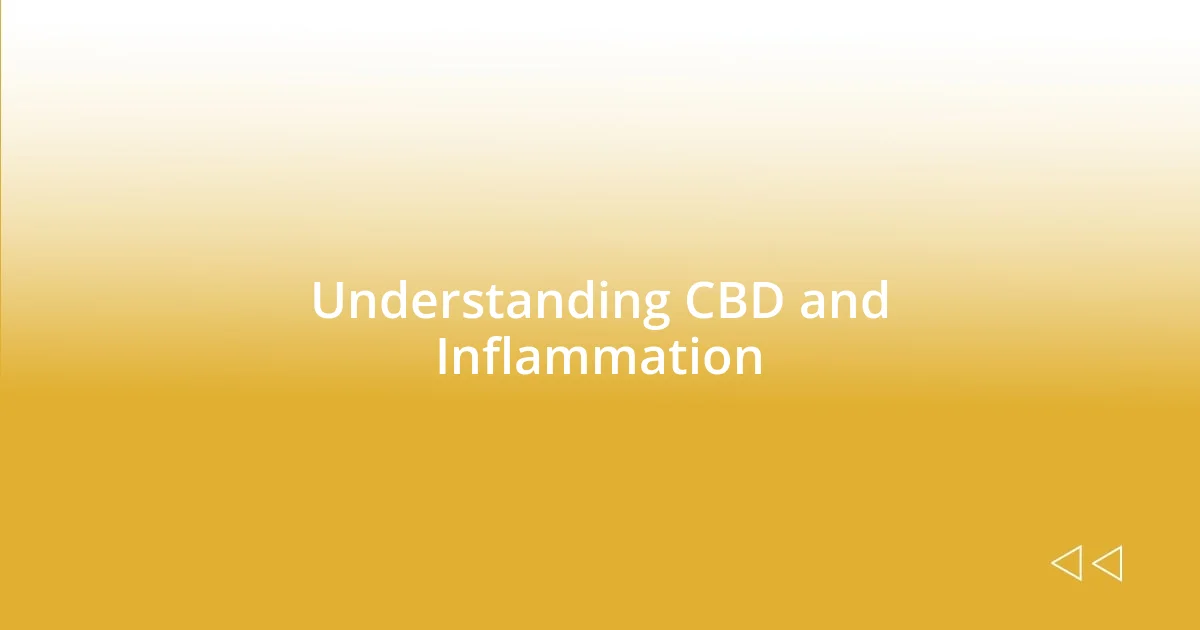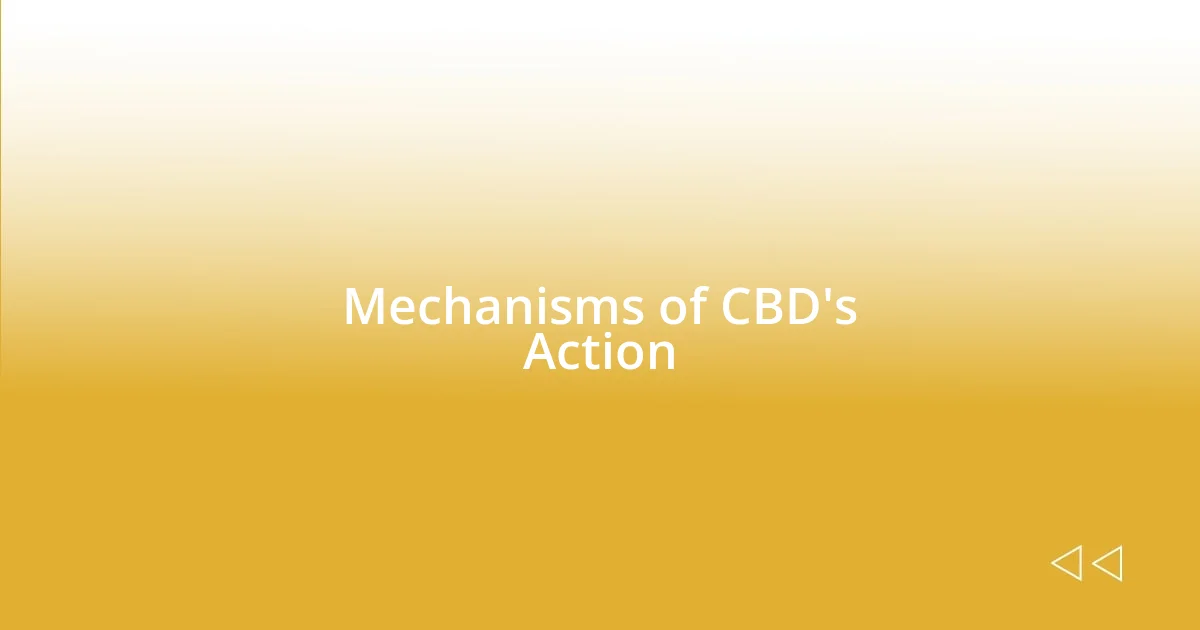Key takeaways:
- CBD shows promise in managing inflammation and pain, as evidenced by scientific studies indicating its ability to reduce pro-inflammatory cytokines and alleviate chronic inflammation.
- Understanding CBD’s interaction with the endocannabinoid system highlights its multiple mechanisms of action, such as receptor interaction, cytokine regulation, and oxidative stress reduction.
- Personal experiences emphasize CBD’s potential not only for physical relief but also for improving emotional well-being, underscoring its holistic benefits in health management.

Understanding CBD and Inflammation
CBD, or cannabidiol, is a compound found in cannabis that has been gaining attention for its potential anti-inflammatory properties. Personally, I remember when I first discovered CBD; I was looking for alternatives to traditional pain relievers for my joint discomfort. It was fascinating to learn that CBD interacts with the body’s endocannabinoid system, which plays a crucial role in regulating inflammation—an insight that made me curious about how it could help me manage my health naturally.
The experience I had with inflammation opened my eyes to the complexities of how our bodies respond to pain and stress. Isn’t it interesting to think about how a natural compound can influence such a fundamental process? Studies suggest that CBD might inhibit the release of inflammatory substances, which makes me hopeful about its role in managing chronic conditions like arthritis. It’s empowering to consider how something plant-based could offer relief where conventional medicine sometimes falls short.
Moreover, my exploration into CBD led me to realize that not all products are created equal. I had to experiment with different brands and forms—tinctures, edibles, or capsules—to find what worked best for me. Understanding the nuances of CBD’s interaction with inflammation not only highlighted the importance of dosage but also emphasized how personalized each individual’s experience can be. Isn’t it remarkable how something so simple can lead to a tailored approach in addressing our personal health challenges?

Scientific Studies on CBD Effects
Scientific studies on CBD and its anti-inflammatory effects have started to shed light on this intriguing compound. For instance, a comprehensive study published in the Journal of Experimental Medicine found that CBD significantly reduced chronic inflammation in mice. It was exciting to read that a compound I had been exploring could have such tangible impacts on inflammatory responses—these findings felt like validation of my own experiences with CBD.
In another interesting study, researchers noted that CBD inhibits the release of pro-inflammatory cytokines, which are key players in the body’s inflammatory process. Reflecting on this, I can’t help but think about how many people, like me in the past, might be searching for effective alternatives to manage their pain and inflammation. It’s rather inspiring to imagine a future where natural remedies, such as CBD, play a major role in our health journey.
| Study | Key Findings |
|---|---|
| Journal of Experimental Medicine | CBD reduced chronic inflammation in mice. |
| Another Study | CBD inhibits the release of pro-inflammatory cytokines. |

Mechanisms of CBD’s Action
CBD’s action in the body is fascinating, especially when you dive into its interaction with the endocannabinoid system (ECS). The ECS plays a pivotal role in regulating various physiological processes, including pain and inflammation. When I first learned about this system, I was impressed by how our bodies have this built-in mechanism for balance. It’s like nature provided us with an internal support system!
Here are some key mechanisms through which CBD exerts its anti-inflammatory effects:
- Receptor Interaction: CBD interacts with cannabinoid receptors (CB1 and CB2) in the ECS, which can modulate immune responses and decrease inflammation.
- Cytokine Regulation: It reduces the release of pro-inflammatory cytokines, helping to temper the body’s inflammatory response.
- Inhibition of Enzyme Activity: CBD may inhibit the activity of enzymes that promote inflammation, leading to a decrease in inflammatory pain.
- Oxidative Stress Reduction: The compound has antioxidant properties that help reduce oxidative stress, further supporting its anti-inflammatory role.
I remember the moment it clicked for me: CBD isn’t just a remedy; it’s part of a larger system that works synergistically to ease discomfort. Understanding these mechanisms feels empowering. It’s like having a toolkit where I can choose the right tool for the job, depending on how my body feels. In my experience, knowing that CBD works at multiple levels gives me a greater sense of control, especially on days I face inflammation flare-ups.

Potential Benefits of CBD Use
CBD offers a variety of potential benefits that have resonated with many, including myself. One of the most compelling aspects is its ability to help manage pain and inflammation. I recall a particularly challenging period in my life when chronic pain significantly affected my mobility. Discovering CBD brought a glimmer of hope, as I experienced noticeable relief that traditional medications hadn’t provided for years. Has anyone else felt that shift from frustration to relief?
Furthermore, the soothing potential of CBD may extend beyond mere physical discomfort. I’ve encountered situations where stress and anxiety tangled with inflammation, creating a cycle that felt nearly impossible to break. What I found striking was that, alongside its anti-inflammatory properties, CBD seemed to create a calming effect that allowed me to breathe more easily and think more clearly. It’s fascinating how one compound can address multiple facets of our well-being!
Lastly, the allure of a natural remedy is hard to ignore, especially for those of us who have tried countless pharmaceuticals with little success. The idea that I could incorporate a plant-derived substance into my routine and feel empowered to tackle inflammation without adverse side effects feels revolutionary. As I explored CBD, I realized that connecting with nature in this way not only supports my physical health but also fosters a deeper relationship with my own body and its needs. Could this be the future of holistic health?

Dosage Guidelines for CBD
When it comes to dosage, I’ve found that starting low and going slow is the best approach with CBD. Many users, including myself, often begin with a dose of around 10-20 mg per day, monitoring how we feel over time. It’s all about listening to your body—after all, what works wonderfully for one person may not be the ideal amount for someone else.
As I adjusted my dosage, I observed changes in my response. For example, when I gradually increased my intake to about 30 mg, I felt a more pronounced reduction in my discomfort. It was like flipping a switch—suddenly, I could engage more fully in my daily activities instead of dedicating my energy to managing pain.
It’s also important to take into account the method of consumption, as each one can affect absorption and efficacy. I experimented with oils, edibles, and topicals, and I noticed that tinctures seemed to work much faster for inflammation relief, while edibles provided longer-lasting effects. Have you had a chance to explore the various forms of CBD? Finding the right method and dosage for your unique needs can truly feel like discovering a personal wellness ally.

Personal Experiences with CBD
I’ve had some transformative experiences with CBD that truly opened my eyes to its potential. One particular day stands out: I felt a surge of tension in my back after a strenuous workout and decided to try CBD oil right before bed. To my surprise, I woke up with considerably less stiffness and the ability to move freely. It felt like rediscovering a part of myself, and I found myself wondering if this could really be my new go-to for recovery.
On another occasion, I was grappling with a flare-up of joint pain that had sidelined me from my favorite hobbies. After a couple of days of using a CBD cream on the affected area, I noticed a change—a relief that allowed me to engage in more activities without that nagging discomfort. It made me reflect: why had no one told me about the ease of integrating something so natural into my routine? The realization that I could manage this pain without relying solely on medication was nothing short of empowering.
The emotional interplay between pain relief and mental clarity has also struck a chord with me. There was a moment when I sat outside on a sunny afternoon, using my CBD tincture for relief from the lingering aches of the day. As the warmth of the sun enveloped me, I felt my worries fade. It prompted me to question the relationship between physical discomfort and emotional well-being—can alleviating one lead to healing the other? My experience seems to hint at that possibility, and it makes me eager to explore CBD’s role in supporting overall health.

Conclusion on CBD’s Efficacy
When I reflect on CBD’s efficacy, I’m consistently struck by how it can transform day-to-day living. I remember a time when I spent hours at my desk, battling inflammation from poor posture. After incorporating CBD into my routine, I felt an undeniable shift; not only did my discomfort ease, but my focus and creativity flourished. Isn’t it fascinating how addressing physical health can spill over into other aspects of life?
The journey of experimenting with CBD has also illuminated some unexpected emotional benefits. I found that reducing physical discomfort allowed me to tap into a sense of calm and clarity—a feeling I’d long thought was elusive. Isn’t it incredible how intertwined our physical and mental states can be? These experiences lead me to believe that CBD could be an essential piece of the holistic wellness puzzle for many.
Ultimately, while more research is needed to fully understand the mechanisms behind CBD’s anti-inflammatory effects, my personal experiences suggest it’s a promising option worth considering. Whether you’re seeking relief from chronic pain or just looking to support your overall wellness, the potential of CBD can’t be easily overlooked. Have you begun to consider how it might fit into your own health journey?















